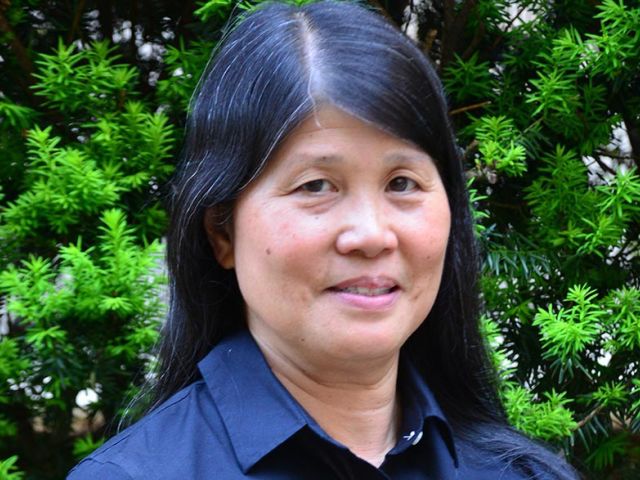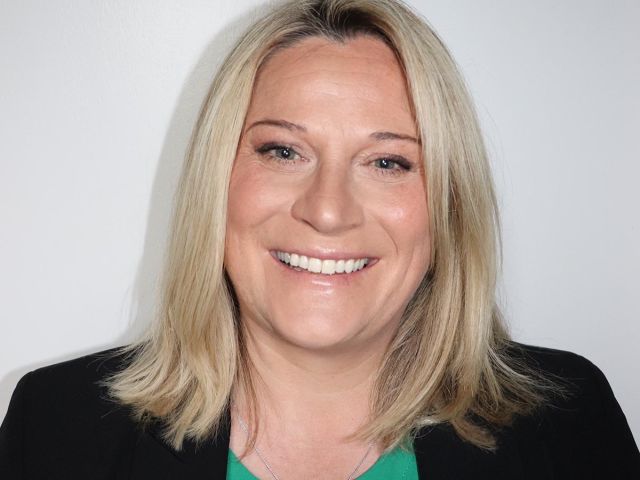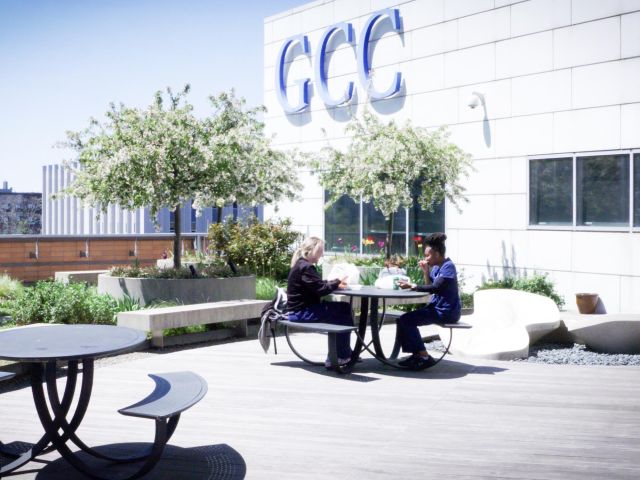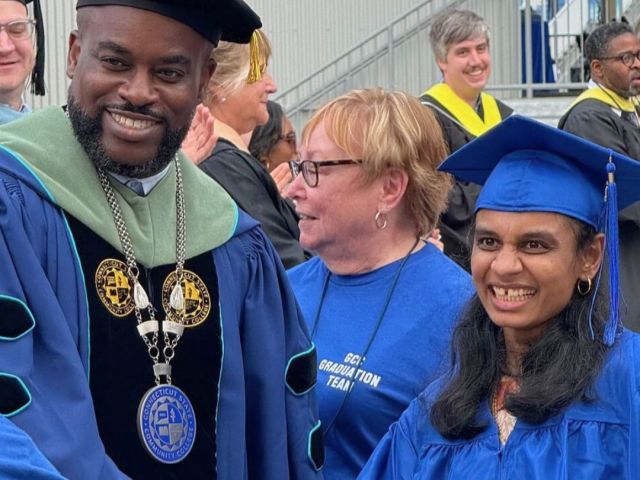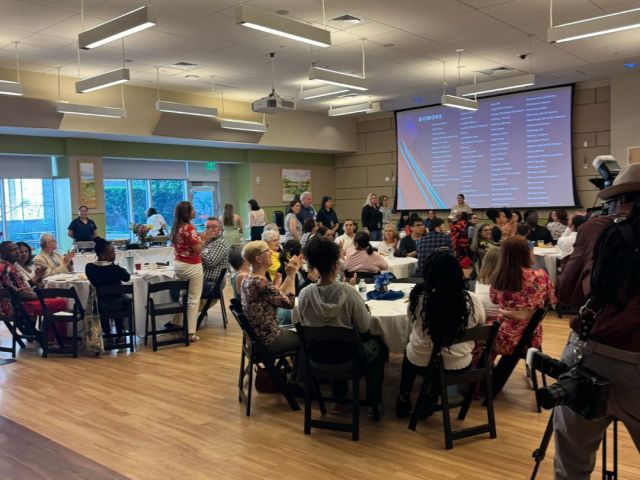News Center
Bringing you the latest news and events from Gateway Community College.
Statway: A New Approach to Math Yields Positive Results
Share
An initiative that changes the way community college students approach math, with strategies that extend far beyond the math classroom, has already shown positive gains. Gateway Community College (GCC) is one of 19 colleges across the country piloting the Statway initiative. GCC faculty and administrators say that the promising initiative will help students move through the curriculum more quickly and help more students who have historically struggled with math to stay the course and to graduate.
The goal of the initiative: to double the proportion of community college students earning college-level math credit within one year of enrollment. In its first year, 52 percent of Statway students nationwide gained college-level math credit in one year, compared to the historical rate of 16.6 percent in three years, tripling the rate of success. At GCC, the percentage rose from less than 17 percent to 40 percent. The program was developed by the Carnegie Foundation for the Advancement of Teaching and the Charles A. Dana Center.
“We are excited about where we are headed and what we have already seen in terms of student progress,” Michelle Breaker, a GCC math instructor and facilitator of GCC’s Statway program. “Brilliant minds from the Carnegie Foundation have been at work on this and collaborated with us in real time. What the initiative does is what we want for community college students in general, to keep them in the classroom, wanting to learn and persisting.”
Statway is a two semester course in statistics. It is designed to address the mathematics needs of students who are going into the social sciences, the humanities or the arts or general non-STEM (Science, Technology, Engineering or Math) careers. Because statistics is a standard tool of research in many non-STEM careers, the course is a good fit with real world applications. On one recent morning in a Statway class, students used NBA basketball player salaries as they puzzled out a statistical analysis. After passing both semesters, students will have finished their developmental math and also have credit for a college-level math course. Students transferring to Southern, Eastern, Central or Western can receive college-level math transfer credit.
At the center of the course is the concept of “productive persistence.” From the start, students are taught to think about the brain as a muscle and to find ways to build it up, using statistics to do so. The goals: students come to believe they are capable of learning math and discover math isn’t just a set of algorithms to be memorized but a connected set of concepts that can be understood and applied. Embedded in the course are study skills, strategies for problem solving and a great deal of collaboration with their peers and with instructor. Students sign a contract and part of that contracting is agreeing to consistently attend class.
There are challenges, particularly in recruiting students, because if they are considering a STEM or math-related major at all, they would need to take more algebra. But because the success rate is so high already, the Statway team is designing a bridge course that students could take to get up to speed on the algebra they need to move into a STEM major.
In Statway, students have the same instructor for two semesters. “We become like a family,” Breaker said. “And that’s really important because statistics is hard. Some of our students have not had success with math and have a math anxiety. This course encourages them to take risks, even if they are afraid. They see that they can try and succeed. Students need to feel socially tied to the class.”
Matthew Long, GCC’S Director of Student Development, said it is important for students to understand that they can arrive at an answer from multiple routes, that there is something gained from the struggle. “We tell students take your own stab at it. See if you can find another way to solve a problem, your own way,” he said. “When you do that you are more invested.”
Support is also built-into the program. The Statway team consists of three instructors and a team of administrators including Long, Mark Kosinski, Dean of Academic Affairs, and Vincent Tong, Director of Institutional Research.
An extensive online portion of the curriculum – with many opportunities for additional practice, exploration and problem solving - is available to students as is tutoring. The curriculum is already version 2.0 and it has improved vastly, Breaker said. All of the data is collected after tests and quizzes and based on that data, the curriculum or materials can be adjusted. She can teach the course in the morning, see that some of it isn’t reaching her students and she can email the Carnegie Foundation and they will make real time changes. The curriculum is always evolving and it is highly tuned to the needs of the individuals in each classroom, she said.
At a recent workshop, more than 25 GCC administrators, faculty, program leaders and support staff gathered to learn more about the initiative and determine if Statway could satisfy their program’s course requirements. Dean Kosinski said the Statway initiative is timely because of the recent passage of PA 12-40, a bill that requires public colleges to limit remedial education requirements to one semester and instead provide more help to students in entry-level credit courses. The GCC college community is closely examining remedial courses and course requirements and developing a plan for the changes that are coming.
Martha Hayes, a GCC professor of English who attended the workshop, said, “The approach applies to so many disciplines. Many students fear writing like they do math and what you create is a mindset, that you can succeed and here are strategies to get there.”
Statway is designed to replace a sequence of courses that can take as long as two or more years once students are placed into developmental math at entry to the community college. Recent studies report that between 60 and 70 percent of students either do not successfully complete the sequence of required courses or avoid taking math altogether and therefore never graduate. Traditionally a student who is two levels below transfer-level mathematics would complete a semester of beginning algebra and a semester of intermediate algebra and then complete his or her degree requirements in mathematics by taking a college-level course such as statistics or college algebra. Statway accelerates the process, integrating developmental and college-level content into a single year-long statistics course.
Early evidence from the first year students shows positive changes on productive persistence measures. Carnegie conducted student surveys with high response rates and found that after three weeks, students had greater enthusiasm for math, they were less anxious about the subject, and they were more likely to believe that with hard work they could improve at it and this represented a significant change.
“We know that sometimes just because a student is putting in effort, it may not be the right effort so we talk about what they can do to figure out how they can do well. What changes can they make in their approach to learning to succeed, to understand,” Breaker said. “This pathway teaches them to persist, to seek challenges.”


